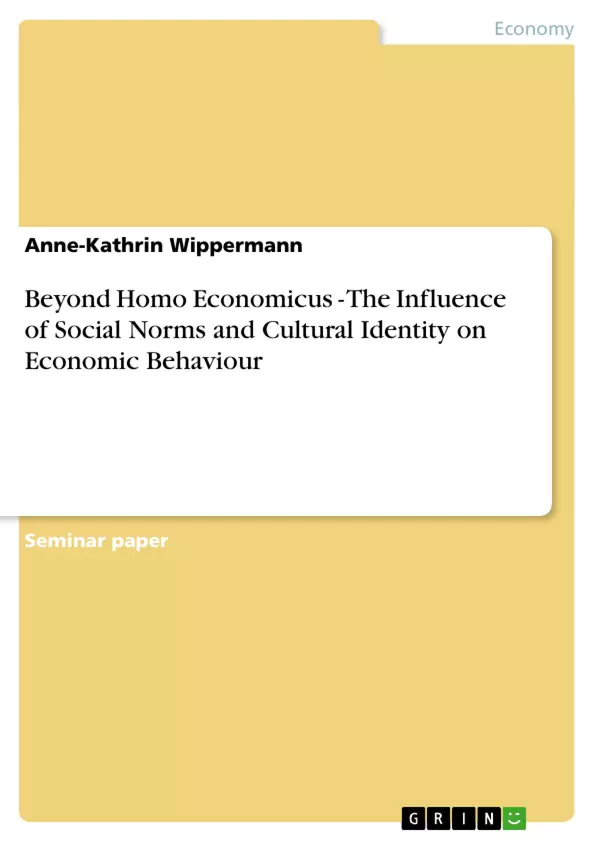Ever since philosophers set up their first models to predict human behaviour, it was apparent that their findings had to be handled with care and that experimental evidence was needed to corroborate their theories. In their models, general assumptions such as perfect knowledge or perfect homogeneity make it obvious that these models could not simply be taken as projections of real markets.
The question, however, is, to what extend these theories have their legitimation anyway. Even though assumptions made by economists when setting up market models may be false, many predictions derived from these models are not. We therefore need to find out what determines the market outcome. However, in order to understand how markets work, we first have to understand how human beings work. Experimental economics can be a valuable instrument for that, because, as Alvin E. Roth put it, experimental economics can “bridge the gap between the study of ideally rational behavior and the study of actual behavior” (Roth, 1991, p. 107).
Inhaltsverzeichnis (Table of Contents)
- I. INTRODUCTION
- 1.1 Economic Theory and Experimental Economics
- 1.2 Human Behaviour, Social Norms and Cultural Identity
- II. INFLUENCES ON ECONOMIC BEHAVIOUR
- 2.1 Homo Economicus vs. Homo Sociologicus
- 2.1.1 The Rationale of Homo Economicus
- 2.1.2 Influences on Homo Sociologicus
- 2.1.3 Combining the Two
- 2.2 Social Norms and Economic Behaviour
- 2.2.1 Norms of Reciprocity
- 2.2.1.1 Experimental Evidence: Norms of Reciprocity
- 2.2.2 Norms of Cooperation and Fairness
- 2.2.2.1 Cooperation and Fairness in Games: The Prisoner's Dilemma
- 2.2.3 Norms of Distribution
- III. CULTURAL VARIATIONS IN ECONOMIC BEHAVIOUR
- 3.1 The Assumption of Cultural Variations in Economic Behaviour
- 3.2 Testing the Model
- 3.2.1 Restrictions to Cross-Cultural Studies
- 3.3 Evidence from Experiments
- 3.3.1 An East-West-German Comparison by Ockenfels and Weimann
- 3.3.1.1 Experimental Designs
- 3.3.1.2 Results
- 3.3.2 Prisoner's Dilemmas in Japan and the United States
- 3.3.2.1 Experimental Design
- 3.3.2.2 Results
- 3.3.3 Bargaining Behaviour in Four Countries
- 3.3.3.1 Experimental Design
- 3.3.3.2 Results
- 3.4 Deducting "Toughness" of Societies from Experimental Results
- IV. SUMMARY AND CONCLUSION
Zielsetzung und Themenschwerpunkte (Objectives and Key Themes)
This paper explores the influence of social norms and cultural identity on economic behaviour, challenging the traditional model of the "homo economicus." It investigates the impact of social norms on economic decision-making and examines how cultural variations influence economic behaviour. Key themes covered include:- The limitations of the homo economicus model in explaining actual economic behavior
- The role of social norms in shaping economic decision-making
- The influence of cultural variations on economic behavior
- The importance of experimental economics in understanding human behavior in economic contexts
- The implications of cultural variations for the generalizability of economic findings
Zusammenfassung der Kapitel (Chapter Summaries)
- I. Introduction This chapter establishes the context by discussing the shortcomings of traditional economic models based on the rational behavior of homo economicus. It highlights the importance of experimental economics in bridging the gap between theoretical models and real-world behavior. Additionally, it introduces the concepts of homo economicus and homo sociologicus, setting the stage for exploring the role of social norms and cultural identity in economic behavior.
- II. Influences on Economic Behaviour This chapter delves deeper into the concepts of homo economicus and homo sociologicus, examining their respective rationales and influences. It specifically explores the impact of social norms, such as reciprocity, cooperation, and fairness, on economic behaviour. Experimental evidence, including the Prisoner's Dilemma, is presented to illustrate the role of these norms in shaping economic decisions.
- III. Cultural Variations in Economic Behaviour This chapter explores the assumption that cultural variations influence economic behavior. It acknowledges the limitations of cross-cultural studies and discusses evidence from experiments that investigate the impact of cultural differences on economic decision-making. Specifically, it examines studies conducted in East and West Germany, Japan, and the United States, focusing on how cultural norms shape bargaining behavior and cooperation in economic games.
Schlüsselwörter (Keywords)
The key concepts explored in this paper include homo economicus, homo sociologicus, social norms, cultural identity, experimental economics, reciprocity, cooperation, fairness, cross-cultural studies, and cultural variations. These terms are central to understanding the influence of social norms and cultural identity on economic behavior, as well as the limitations of traditional economic models.Frequently Asked Questions
What is the "Homo Economicus" model?
It is a theoretical model of human behavior that assumes individuals are perfectly rational, self-interested, and seek to maximize their own utility.
What are the limitations of traditional economic theory?
Traditional models often fail to account for social norms, cultural identity, and altruistic behaviors that significantly influence real-world economic decisions.
How do social norms influence economic behavior?
Norms of reciprocity, cooperation, and fairness often lead people to act in ways that contradict pure self-interest, as seen in experiments like the Prisoner's Dilemma.
What did the East-West-German comparison reveal?
The study by Ockenfels and Weimann showed that different social and political backgrounds can lead to variations in economic behavior even within the same nation.
Why is experimental economics valuable?
It bridges the gap between study of ideally rational behavior and actual behavior, providing empirical evidence on how human beings really work in markets.
- Arbeit zitieren
- Anne-Kathrin Wippermann (Autor:in), 2006, Beyond Homo Economicus - The Influence of Social Norms and Cultural Identity on Economic Behaviour, München, GRIN Verlag, https://www.grin.com/document/50307



